Grok, Elon Musk's AI chatbot, is now accessible to X users for free. The move, which allows non-Premium subscribers to send up to 10 messages to Grok every two hours, was observed by a number of users on Friday. Grok, a "humorous AI assistant," was only accessible to Premium users when xAI first released it last year. Grok was given a text-to-image generating feature by xAI in August, and it proved to be able to generate some dubious-looking graphics.
Last month, TechCrunch revealed that Musk's xAI has begun testing a free Grok version in select areas. Expanding Grok's reach might help it compete with chatbots that are already free, such as Microsoft Copilot, Google Gemini, OpenAI's ChatGPT, and Anthropic's Claude. According to a Wall Street Journal story, xAI, which collected $6 billion in its most recent funding round, is also thinking of releasing a stand-alone app for Grok, something that ChatGPT, Gemini, and Claude already have.




.jpeg)













.jpeg)




















